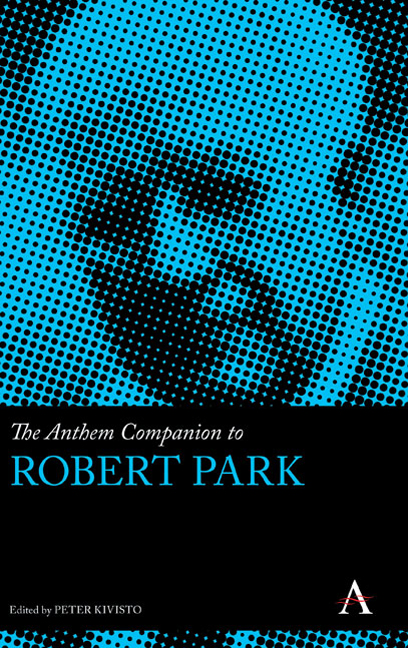Book contents
- Frontmatter
- Contents
- Introduction: The Legacy of Robert Ezra Park
- Chapter 1 A Twisted Path: Park, Gender and Praxis
- Chapter 2 Robert Park's Journey into Sociology
- Chapter 3 Beyond “Get the Seat of Your Pants Dirty in Real Research”: Park on Methods
- Chapter 4 The Basic Components of Social Action: Mead versus Park
- Chapter 5 Robert E. Park: Neglected Social Psychologist
- Chapter 6 Robert E. Park's Theory of Assimilation and Beyond
- Chapter 7 Robert Park's Marginal Man: The Career of a Concept in American Sociology
- Chapter 8 Marginality, Racial Politics and the Sociology of Knowledge: Robert Park and Critical Race Theory
- Chapter 9 The Cities of Robert Ezra Park: Toward a Periodization of His Conception of the Metropolis (1915–39)
- Chapter 10 The Impact of Robert E. Park on American Sociology of Religion
- Chronology
- Contributors
- Index
Chapter 1 - A Twisted Path: Park, Gender and Praxis
Published online by Cambridge University Press: 10 January 2018
- Frontmatter
- Contents
- Introduction: The Legacy of Robert Ezra Park
- Chapter 1 A Twisted Path: Park, Gender and Praxis
- Chapter 2 Robert Park's Journey into Sociology
- Chapter 3 Beyond “Get the Seat of Your Pants Dirty in Real Research”: Park on Methods
- Chapter 4 The Basic Components of Social Action: Mead versus Park
- Chapter 5 Robert E. Park: Neglected Social Psychologist
- Chapter 6 Robert E. Park's Theory of Assimilation and Beyond
- Chapter 7 Robert Park's Marginal Man: The Career of a Concept in American Sociology
- Chapter 8 Marginality, Racial Politics and the Sociology of Knowledge: Robert Park and Critical Race Theory
- Chapter 9 The Cities of Robert Ezra Park: Toward a Periodization of His Conception of the Metropolis (1915–39)
- Chapter 10 The Impact of Robert E. Park on American Sociology of Religion
- Chronology
- Contributors
- Index
Summary
Robert E. Park played a central part in defining sociology as a natural science. He imagined sociologists as unbiased and unaffected by the human behavior they studied: “their role was to be ‘the calm, detached scientist who investigates race relations with the same objectivity and detachment with which the zoologist dissects the potato bug’ “ (Ernest W. Burgess, cited by Matthews 1977, 116). This metaphor attacked the earlier intention of many founders of sociology who envisioned sociology as a moral science. These founders studied society to learn how to alleviate poverty, create social justice and enhance human freedom (Becker 1971; Deegan 1988; Feagin, Vera and Ducey 2015).
Park's assault on sociology as a moral science included his aversion to what he called “do- goodism.” He particularly criticized the work of female sociologists who applied their sociological knowledge with the help of urban neighbors of social settlements and hundreds of thousands of clubwomen. These female sociologists, often led by Jane Addams, changed American society and instituted a plethora of laws and government programs concerning the rights of workers, immigrants, the poor, the disabled, children and mothers. These sociologists were fundamental to the creation of the welfare state in the United States (Goodwin 1994; Deegan 1987, 1991, 1995, 1997; Lengermann and Niebrugge- Brantley 1998; Skocpol 1992). An example of Park's view of the relation between women, politics and sociology is found in an account recorded by a former student, Theodore K. Noss. Here, Noss notes a particularly extreme exchange between Park and a female student who engaged in social reform and was, apparently, a Quaker – as were many female sociologists; for example, Edith Abbott, Jane Addams, Emily Greene Balch and Florence Kelley (Deegan 1987, 1991). After castigating Quakers’ “self- righteous meddling in the abolition movement,” Park allegedly claimed “the greatest damage done to the city of Chicago was not the product of corrupt politicians or criminals but of women reformers” (Noss, cited by Raushenbush 1979, 97).
I always found this statement by Park to be absurd, a serious misperception of reality and the accomplishments of sociology as an applied science (e.g., Deegan 1985).
- Type
- Chapter
- Information
- The Anthem Companion to Robert Park , pp. 17 - 36Publisher: Anthem PressPrint publication year: 2017



